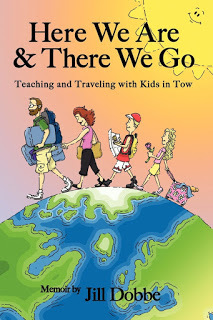Here We Are & There We Go by Jill Dobbe – A Review
It is a while since I read this book but note I have not included my review of it in this blog. Today I rectify that oversight.
Before commencing my review, I would like to remind readers I am not a trained or recognised critic. Consequently, as always, the following comprises my personal observations and views . Readers need to remember reading, when not of technical or scientific material, is primarily a subjective experience. This means when we write a review it is usually about how the story impacts upon us as an individual rather than a series of objective technical observations. At the author’s request I received this book as an exchange for one of mine, agreeing to each review the others.
 ‘Here We Are & There We Go’ is a personal account of how the author and her husband travelled to a variety of different countries on teaching assignments and of their lives in those places. There may be times when you may feel like agreeing with some of their relatives who thought them crazy to undertake such a life style with their two young children; one and two at the start.
‘Here We Are & There We Go’ is a personal account of how the author and her husband travelled to a variety of different countries on teaching assignments and of their lives in those places. There may be times when you may feel like agreeing with some of their relatives who thought them crazy to undertake such a life style with their two young children; one and two at the start. In the prologue Jill Dobbe effectively shares how having been born and brought up in a provincial town she has a desire to travel and see the world; you certainly find yourself empathising with her feelings. However, before she can put any of her plans into practice she marries her soul mate and has two young children. Fortunately, her husband turns out to have similar desires and with both of them feeling restless they ultimately venture out into overseas teaching assignments; they are both qualified teachers.
Now before going on I have to confess I was initially a little disappointed. Having travelled fairly extensively myself I was looking forward to reading about countries and places I had not visited anticipating detailed accounts of the landscapes, architecture, culture, history, social conditions and life styles of the indigenous people. Although the book does in places contain a little of this it is primarily about the family themselves. A point I had to remind myself of. It was I who had made an erroneous assumption and consequently initially took the wrong approach to my reading of the book. Realising my mistake I undertook a second speed read of the story and having set aside my presumptions was able to enjoy the account of their adventures and experiences.
Their adventures start in chapter 1 on the island of Guam in the Pacific and move in chapter 2 to Singapore. In these chapters we are taken from event to event in quick succession with some descriptions of how the local inhabitants celebrate certain events, what is considered bad mannered and how daily life such as shopping was conducted. As I have said I had to remind myself this was a personal account of one family’s experiences and not an exegesis of different cultures and countries. Nonetheless, as previously mentioned it would have been nice to hear more about the places themselves. One of my relatives lived in Singapore for a while so I let them read the second chapter. They did say there was so much to see and enjoy not only in Singapore but also in adjoining Malaya and considered it would have enhanced the read if more had been shared. For example; Tiger Balm Gardens are mentioned but no description of this unusual place is given. Also there is a quick reference to ‘exotic’ flowers but no mention of the myriad of different and wonderful orchids which are grown and cultivated in the area. But again I must remind myself this is a personal family tale.
I found chapter three to be very different and absorbing. Here we have the account of their five year stay in Ghana, Africa. It quickly becomes clear they loved it and in the telling you feel more involved and share in their enthusiasm for the country and culture. How the scenery takes the breath away and how the locals deal, fairly or unfairly, with perceived wrong doing are but a couple of the qualities that come through. You are left in no doubt of Jill and her husband’s pleasure with the place and I would not be surprised to hear of them returning to an African country for a further teaching assignment in the future.
Chapter 4 deals with their stay in Mexico, which they choose on this occasion because it meant a less arduous journey to and from their home in Wisconsin. No longer would they endure twenty-four hour flights and could in fact drive to and from their home. Of course, as Jill points out, it was also nice that they were in the same hemisphere and consequently did not have to get up in the middle of the night to telephone their relatives at a reasonable hour for them.
I found chapter 5 very interesting. Something few of us would have even considered is the idea of ‘reverse culture shock’. The family had been away from the United States for so long that the children really had little idea of what life there was like and their parents had virtually forgotten what it was like. Jill Dobbe’s description of this reverse culture shock creates a feel for what they were undergoing. It also honestly shows how easy it is to be quickly drawn into what is considered acceptable and necessary for life, whereas in fact many of these ‘necessities’ are not such. She also compares how they lived life without these items in the foreign countries they stayed in and got on well enough, even though it was uncomfortable at times. Certainly anyone who is contemplating leading such a life would do well to read this chapter before attempting to resettle in their homeland no matter were that is; the principles apply in general to all life styles.
Besides telling us about the countries they lived in, the author also treats us to additional information regarding the variety of places they stopped over in on their way to and from the USA. Understandably, these are recorded in chronological order however, for me personally, I think it would have been preferable for these to be lumped together in a separate chapter ‘Incidental visits’ or something like that. But we are all unique and different and have alternative ways of doing things.
As mentioned earlier some of their relatives thought Jill and her husband were crazy for taking their children on such adventures of life and even irresponsible. In fact some could not understand their desire to live in foreign places, many of which did not have the facilities they took for granted. Such attitudes are regrettably frequently displayed by people who have lived in rural and provincial locations all their lives. I personally think, as difficult as it was, by enduring the hardships and difficulties they have provided their children with a broad, multicultural education and upbringing from which they will benefit all their lives.
I have said this is a personal tale personally told. Although I have never met Jill Dobbe or her family, I do feel that if we did meet it would simply be a continuation of the discussions from the book; it is almost as if I can hear her voice in my head. For those who are considering travelling long term or living in third world countries with young children this would be an interesting read. I give a three star rating. If you are not a regular reader of my reviews, you may like to read ‘Book Reviews - Star Ratings’ to understand my take on ratings.
The book is available in both paperback and e-formats:
Amazon.com
Amazon.co.uk
Published on August 22, 2016 09:54
No comments have been added yet.



